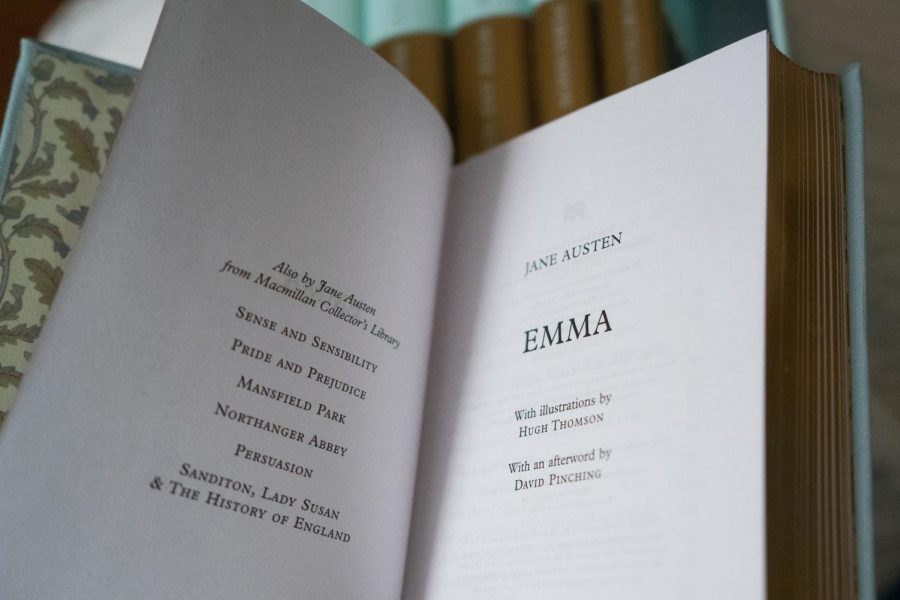Alumnus Corner
Various topics from the lens of those who were once part of The Red & Black. This edition: Humanities
Photo by Stell
Settle in with a good book that still attracts readers so many years later.
Jane Austen. The name is familiar in almost every household as a pioneer of feminist literature of the 19th Century. Her work has always been relevant to society, connecting people and providing commentary on issues that still exist today.
There has been a noticeable surge in her popularity recently, with both a mini series of her last, unfinished novel Sanditon and a new film adaptation of Emma on the way.
The series, produced by PBS, takes Austen’s original eleven chapters of Sanditon, and builds upon them, finishing the story. Written by Andrew Davies, the show is set to premiere this Sunday, January 12th.
Meanwhile, the newest adaptation of Emma, Austen’s beloved comedy, is set to release in the U.S. on February 21st.
So, why such a sudden interest in Jane Austen? Her novels which take place during the 19th Century address many sentiments of today’s society, despite the large gap in years.
The 19th Century a time of massive change, from the abolition of slavery, major waves of immigration, and social reform for women and the working class to major technological advancements and huge political divisions that sparked civil war across continents.
We are, once again, facing issues very similar to this period in history. Just take a look at our divisive political climate and the things causing that divide: social reform, issues of equality, and major technological advancements.
We are echoing the past, and it is only natural that people will turn to literature and entertainment, which is naturally full of social commentary, to help understand how to feel and act and handle the situation at hand.
“Austen is the master of tales of social commentary, ones which make us reconsider our behavior according to the times,” said AP Literature teacher Mrs. Sullivan. “Human nature transcends time and place; however, women have become more empowered and have found a voice. Austen, like many other brilliant female authors, was way ahead of her time. She was the voice for those who would be held back in society simply for their gender.”
Austen provides young adults, especially women, with a chance to feel empowered, a chance to feel heard. She, along with other female writers of the time, paved the way for many women, so it is no wonder that, in a time of massive movement towards women’s equality (especially in these fields of cinema and writing), they would turn to the novels and stories that made it possible.
Another fine example of this is Louisa May Alcott’s Little Women, which was just adapted again this past December. Directed by Greta Gerwig, the film finally confronts the original, unsatisfactory ending in which Jo March marries, despite it being inconsistent with her character, that Alcott’s publisher demanded. Thus, making the film all the more accurate and influential.
As AP Language teacher, Mrs. Mckeough, said, “Jo March is both a literary and personal hero to many young women. I can remember reading about the March sisters when I was eleven years old and I can’t help but feel grateful for their story and the power that struggle had to teach me how to face the world as a young woman with dreams and aspirations. Gerwig’s adaptation breathes new life into the story I loved so much as a girl with characterizations that speak to a modern audience while still maintaining the same conflicts Alcott wrote about so long ago”.
People, young women, especially, are turning to these classic authors to find answers to questions about class, feminism, and individuality. They are looking to the past in order to look to the future. And these authors, from Austen and Alcott to Bronte and Eliot, provide all this and more.

Gr. 12
"You must strive to find your own voice because the longer you wait to begin, the less likely you are going to find it at all." -John Keating



Isabella • Jan 14, 2020 at 11:40 am
I loved reading this article and hearing from an alumni of Pat-Med. This idea of “Alumnus Corner” is very clever and makes me excited to graduate just to come back and write one too.
delaney • Jan 14, 2020 at 11:40 am
As much as I love the classics, I do think we need more modern new stories coming soon. Although, I think something is to say for going back and revisiting old works because [people can still take very valuable lessons from them.